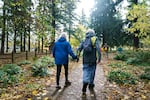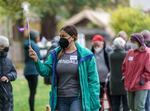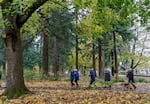
Jeannette Kempe-Ware, left, holds the hand of her husband, Gordon Ware, as they walk through Alberta Park in Portland during a dementia-friendly walk, Nov. 10, 2021. The pandemic has been particularly isolating for people with dementia and their families. The weekly walking group, in partnership with Oregon Walks, offers them a chance to connect.
Kristyna Wentz-Graff / OPB
It’s 10 a.m. and the sun is out. Birds sing in the willows that grow along Crystal Springs Creek in Southeast Portland.
Two dozen seniors crowd around a park bench, filling out name tags and greeting each other.
“I’m Kent, as best I can remember,” says one.
“Hi Gordon, how are you doing today?” asks their guide for the day, Ashton Simpson.
“I love you,” Gordon Ware responds to Simpson.
“I love you too, brother. Enjoy the walk.”
This is Portland’s dementia-friendly walking group, a collaboration between the local Alzheimer’s Association and Oregon Walks.
Memory loss in a pandemic
Dementia is an umbrella term for a certain kind of memory and speech loss. Alzheimer’s is the most common cause.
The pandemic has been particularly brutal for people with dementia and their families.
Most people with dementia are at high risk from COVID-19 due to their advanced age. Whether they live at home or in a care facility, most have lived under some degree of isolation as a way to protect them from the virus.
But there can be an extra layer of tragedy to their isolation: they may not remember why they’re no longer getting visitors, or can’t do the activities they enjoy.
“They may not understand what’s going on with the pandemic,” said Heidi Rowell, speaking as program director of the Alzheimer’s Association Oregon & Southwest Washington chapter.
“All they know is that people that were previously coming to see them are not coming to see them any longer.”

Katya Samodurov of the Oregon & SW Washington chapter of the Alzheimer’s Association holds an Alzheimer's flag as she leads a walk through Alberta Park in Northeast Portland during a dementia-friendly walk, Nov. 10, 2021.
Kristyna Wentz-Graff / OPB
This walking group came together last fall, in the lull between the delta and omicron variants of the coronavirus, to give some of the people at highest risk from the disease a safe way to be together.
Their route covers about a mile, through Westmoreland Park and the nearby neighborhood.
“On a beautiful day like this, we might get a few ducks to fly over,” Simpson, the executive director of Oregon Walks, tells the group as they head down a wooden boardwalk into the marsh.
“Just come out, walk for your health, walk for everything,” Simpson says.
“Walk for your spirit,” a woman responds.
The power of walking
Ware walks alongside his wife Jeannette Kempe-Ware.
They’ve been married 30 years.
Ware has Alzheimer’s, and he doesn’t speak much, apart from saying “hi” to each new person and telling them that he loves them.
That’s Ware’s way of saying he’s happy to be here, his wife says.
“He looks forward to it and because he knows he’s going to be around other people,” Kempe-Ware explains.
“Oh yeah!” said Ware.
Kempe-Ware says her husband still understands and responds to the emotions around him, and needs the company of other people more than ever.
“When someone gives you good vibes, you get good vibes back and that never leaves, that stays true until the day you die,” she said.
Ware was a physicist and an architect. He worked on reconnaissance satellites. He still lives at home with his wife, who is his caregiver around the clock. She enjoys his company. They look at art, listen to music, and go on long walks.
But since Alzheimer’s has taken Ware’s ability to express himself, other people don’t know how to react to him, or see him as a full person deserving of respect, Kempe-Ware says.
So the couple was already struggling against the social isolation brought about by his Alzheimer’s when the pandemic struck and made life exponentially lonelier.

Walkers pass through Alberta Park in Portland during a dementia-friendly walk, Nov. 10, 2021. The walks went on hold during the omicron wave of COVID-19, but they're planned to resume in April.
Kristyna Wentz-Graff / OPB
Most people with Alzheimer’s are 65 and older, at much higher risk of complications and death from COVID-19. But early data suggests the pandemic has also driven up the death rate from Alzheimer’s itself. In Oregon, for example, the number of deaths due to Alzheimer’s was up about 10% in 2020.
One theory is that social isolation is making people with Alzheimer’s go downhill faster: with speech, mobility, and brain function deteriorating more quickly.
Wendy Ferguson, who is walking with her mom, Sue Garmston, has seen that happen firsthand.
“My mom has declined so much during COVID,” she said. “A lot of it is just because of the isolation. All of the things that she used to do to fill her cup got pulled away.”
The senior centers closed. Group activities were cancelled at Garmston’s retirement home.
Ferguson found herself worrying about her mom all the time. She’s found it therapeutic to walk with other people going through the same thing. It’s helping Ferguson accept her limits as a caregiver – and her mom’s limits.
“I love going on the walk,” said Garmston, who once climbed Mt. Whitney when she was in her 50s.
“And you walk every day with Georgie, rain or shine,” Ferguson tells her mom, referring to the dog at the end of a leash in front of them.
Finding community
Most people on this walk came with a caregiver. Lorri Weiss brought herself.
She’s 64 years old and recently retired. Weiss was teaching high school math when the pandemic started. That’s when she found out she had Alzheimer’s.
In the walking group, she can share whatever is on her mind, whether it’s her plans to start swimming again, or what it feels like to get lost even when you’re going to a familiar address.
“We get an opportunity to talk about things that only we experience, things that are difficult for us,” she said.
Weiss is part of an Alzheimer’s support group too, that meets over Zoom.
“There’s nothing that can replace meeting people in person,” she said.
The dementia-friendly walking group went on hold during the omicron wave of COVID-19. It will start meeting again in April.
The Alzheimer’s Association provides a free, 24-7 helpline to connect people to information and resources in their community. The number is 800-272-3900.
